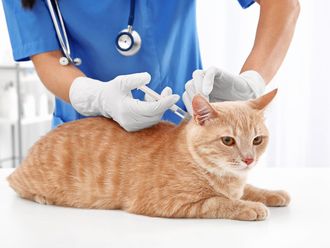
Janet Ruddock was crushed: She had dreamt of greeting her first grandchild, and now that once-in-a-lifetime experience had been marred by the embarrassing problem that had derailed her life for nearly a decade.
In June 2010, Ruddock, then 59, and her husband had flown to Vancouver from Washington, to meet their new grandson. But soon after they arrived, Ruddock’s intractable sweating went into overdrive.
As she sat in a rocking chair, perspiration drenched her head and upper body, soaking her shirt and dripping on to the 4-week-old infant.
“I burst into tears,” Ruddock recalled. “All I can remember is the feeling that I’m wet, this poor baby’s wet and a moment you should always remember is ruined. You’re never going to get it back.”
For Ruddock, that event precipitated a suicidal depression. For the previous eight years she had undergone tests, taken drugs and endured the bafflement — and scepticism — of a parade of doctors she consulted about the extreme, unpredictable sweating that engulfed her head and upper body.
After confiding her despair to a relative, she began seeing a psychiatrist. By chance, a few months later she learnt about a woman whose experience mirrored her own and provided her a much-needed road map.
“It’s a fascinoma,” said retired Washington internist Charles Abrams, using the medical slang for an unusual — or unusually interesting — case. “You usually hate for patients to come in and say, ‘I found this on the internet,’” said Abrams, who treated Ruddock until his retirement last year. “But every once in a while, something is brought to your attention.”
Ruddock, whose husband, Frank, is a Canadian diplomat, had tried to live with what she assumed were hot flashes, which began sometime in 2001.
While sitting at a friend’s cottage that summer, Ruddock suddenly experienced a drenching five-minute episode.
“What was that?” her friend asked, concerned. Ruddock, who had not experienced a similar problem while living in three African countries to which her husband had been posted, replied that she assumed it was a classic symptom of menopause.
“That’s not what the rest of us get,” Ruddock remembers her friend saying. “What does your doctor say?”
Ruddock hadn’t consulted her doctor, assuming that the episodes — which ranged in severity and lasted from a few seconds to more than five minutes — would dissipate with time. But after a year the sweating showed no sign of abating and she became increasingly embarrassed when it occurred in public.
She saw her long-time general practitioner in Ottawa, where her family was then living. The doctor performed a complete physical but found nothing amiss. Ruddock was prescribed hormone replacement therapy, which is sometimes used to treat severe hot flashes. When the first drug failed to help, she began taking a second, which didn’t seem to do much, either.
Ruddock kept a symptom diary, but noticed no pattern: Her sweating was not triggered by temperature, stress, activity level or time of day. And unlike many menopausal women, she never experienced night sweats. Some weeks were better than others, containing days with only mild episodes, while at other times the sweating was so severe, Ruddock said, that “I looked like I just stepped out of the shower”.
Oddly, her palms, underarms and the soles of her feet remained dry.
In 2003, she was referred to an endocrinologist. Ruddock said the doctor observed one of the episodes and agreed it was abnormal. The specialist tested her for other conditions that can cause profuse sweating, including several cancers, diabetes, infections including tuberculosis and an overactive thyroid. She underwent MRI, CT and nuclear medicine scans.
By 2004, “three very good doctors had found nothing”, Ruddock said, referring to her gynaecologist, GP and endocrinologist. She wore a tank top at home during the freezing Ottawa winters and had learnt to deflect the concerns of friends who witnessed an episode. But she felt increasingly self-conscious about going to restaurants in the middle of January wearing summer clothes.
While several close friends knew about what she called her “meltdowns”, Ruddock did not explain them to people outside her inner circle. “I didn’t want to tell people I had major sweating problems,” she said. “It’s embarrassing.”
By 2005 the focus shifted to her anxiety, which Ruddock said was largely caused by the fear of an attack. She saw a psychologist and tried a series of psychiatric drugs including several antidepressants, which did little for the excessive sweating but seemed to make her less anxious.
The endocrinologist repeated a battery of tests and again found nothing. The specialist noted that the sweating was excessive and fit the definition of hyperhidrosis. She noted that none of the four HRT drugs had helped and suggested that Ruddock was exaggerating. The message was clear: Learn to live with it.
“I was left feeling like a menopausal drama queen who simply could not cope with it like many other women did,” she said. She stopped taking hormones and just tried to power through the increasingly severe episodes.
During a 2009 physical prior to moving to Washington, Ruddock received a diagnosis of high blood pressure. The hypertension drug she was prescribed seemed to lessen the sweating. She also began taking a new antidepressant.
By 2010, the sweating had gotten worse and she saw a new internist in the district. “I’d start getting ready to go out and put on make-up and sweat it all off,” she said. Sometimes she had to change clothes twice before she could leave home. The doctor upped the dose of her blood pressure drug and told her to stay on the antidepressant.
Then came the incident in Vancouver, which was followed by “a complete nervous breakdown” a few days later in a Seattle hotel. “I decided life wasn’t worth it and that I couldn’t go on,” she said.
Her husband insisted she see a psychiatrist when they got back to Washington. Ruddock also turned to her brother-in-law, a physician, sending him a list of medications she was taking to see if they might be the problem, although other doctors had said they were not.
He told her that her antidepressant might be partly responsible: One of its side-effects is increased sweating. After she stopped taking it, Ruddock said, she began to feel a bit better.
On a beautiful Saturday in late August, her husband suggested a stroll around their neighbourhood in Old Town Alexandria. After she experienced two drenching sweats, the couple trudged home. “All I could think of is that here are people having a wonderful time and I can’t do this and I won’t be able to do this,” she recalled.
About two hours later, Ruddock was lying in bed when her husband walked into the room, handed her a printout and said, “It’s you.”
Frank Ruddock, who had turned to the internet hoping to find something that might help his wife, had unearthed a 2006 article by doctors in Amsterdam. They described the case of a 56-year-old woman with severe idiopathic generalised hyperhidrosis — profuse widespread sweating with no known medical cause — who was apparently cured of the problem after taking oxybutynin, a drug she was given to treat urinary urgency.
Six months after starting the drug, the woman, whose sweating had been so bad she couldn’t leave her house without taking towels, had no such difficulty. The Dutch doctors speculated that the drug’s anticholinergic effect — it blocks the neurotransmitter acetylcholine and has a drying effect — might be responsible.
But they noted that the medicine was not approved to treat hyperhidrosis in Europe or the United States. “Only anecdotal reports [showing its effectiveness] exist in the literature,” they wrote, urging that a placebo-controlled clinical trial be mounted to study the safety and effectiveness of the medicine in people with hyperhidrosis.
Unlike cases where sweating is limited to a body part — the underarms, palms or feet, which can be treated with Botox injections, antiperspirants or even surgery — there are few treatments other than hormones for generalised hyperhidrosis.
Ruddock read the article and was stunned. At the suggestion of her psychiatrist, she had begun seeing a new internist, Abrams. He had performed some tests and read her voluminous records from Canada but had no new ideas about how to treat her sweating.
Abrams said he initially wondered whether Ruddock might be addicted to painkillers or whether a psychiatric problem might be responsible for her sweats. She looked drained and sometimes damp, but he saw nothing as severe as she described. “Her husband seemed legitimate and vouched for the fact that her blouse would be soaking wet,” he recalled.
“It was pretty bizarre,” Abrams added, “especially for the wife of a diplomat who needs to be in the public eye.”
During an appointment in September 2010, the Ruddocks presented him with the study and asked if he would prescribe the drug. After reading it, he agreed. (It is common practice for doctors to prescribe drugs “off label” — for uses other than those for which they have been approved by the Food and Drug Administration.)
Abrams had given the drug to patients with urinary problems. Ruddock had been through extensive testing that had ruled out serious illnesses of which sweating is a symptom, such as lymphoma. And she had taken drugs that were potentially more dangerous, such as hormones, which are linked to the development of certain cancers.
“I didn’t see any downside,” said Abrams, who noted that the condition “was clearly ruining her life”.
The outcome surprised Abrams: Five days after starting the drug, Ruddock’s sweating stopped; three years later, it has not recurred. She still takes the drug every day.
Other than dry mouth and an increased risk of heat stroke — the inability to cool the body through perspiration can be dangerous — Ruddock says she has her life back. In 2011, as she played on a beach in Mexico with her grandson, she marvelled at the difference between that visit and their first a year earlier.
She credits Abrams’s willingness to consider an unorthodox treatment. “Many doctors don’t appreciate information presented by patients,” she said. “Thank goodness Dr Abrams was prepared to think outside the box and act.”
Abrams said he suspects one reason — but not the only one — the drug has worked may be that Ruddock believes in it, a phenomenon widespread in medicine known as the placebo effect.
“She came to me with the problem and the solution,” he said. “Sometimes it’s about a good collaboration with a patient.”
-Washington Post












